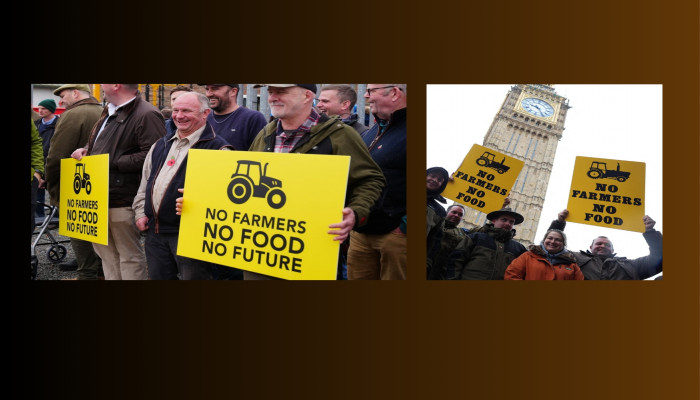UK farmers protest inheritance tax changes in largest demonstration against Labour government
- In Reports
- 10:11 PM, Nov 19, 2024
- Myind Staff
Thousands of farmers gathered in central London on Tuesday in the largest demonstration against a policy introduced by the UK's centre-left Labour government since it assumed power in July. The protest was sparked by the inheritance tax changes announced in last month's budget by Chancellor of the Exchequer Rachel Reeves. Protesters, many holding placards that read "No farmers, no food," were joined by a procession of tractors driving past the Houses of Parliament.
While the immediate trigger for the protest was the proposed tax change, the demonstration also reflected wider dissatisfaction among rural communities. Many farmers and countryside residents have long felt neglected by successive governments, particularly following Britain's departure from the European Union. Under Reeves’s plan, individuals inheriting agricultural assets valued above one million pounds (approximately $1.3 million) will be subject to a 20% inheritance tax, half the standard rate, starting in April 2026. Previously, these agricultural assets were exempt from inheritance tax.
The proposed tax would be payable in instalments over a period of 10 years, interest-free, and would still exclude many estates valued under £3 million due to various allowances, including those for married couples. Government estimates indicate that 73 percent of farms would remain unaffected by the change.
However, critics argue that the removal of the exemption could force some families to sell their farms instead of passing them down to the next generation. Despite the cold, rainy conditions in central London on Tuesday, police estimated that over 10,000 people gathered to protest against the measure, which some have dubbed the “tractor tax.” This demonstration followed a similar protest in Wales last week, where farmers gathered outside a conference venue while Prime Minister Keir Starmer was speaking.
British farmers are generally less confrontational in their protests compared to their European counterparts. However, Tuesday's demonstration mirrored a much larger march than in 2002, when a previous Labour government was in power and hundreds of thousands gathered to oppose plans to ban fox hunting with dogs.
More than two decades later, many farmers feel the effects of Brexit, believing they’ve been left worse off. While EU membership provided access to substantial agricultural subsidies, the system being introduced by the UK government is seen by many as inadequate.
At the same time, the cost of exporting agricultural products to Europe has increased, and domestic profit margins have been squeezed by major supermarket chains. Labour has traditionally struggled to gain support in rural areas, which have been strongholds for the opposition Conservative Party. However, widespread dissatisfaction with the Conservatives and a call for change helped propel Keir Starmer to a decisive victory in July’s general election, with his party now representing a larger number of rural constituencies.
On Tuesday, some protesters wore T-shirts emblazoned with the slogan: “Keir Starmer, The Family Farmer Harmer.”
“I think the industry is feeling betrayed, feeling angry,” Tom Bradshaw, president of the National Farmers’ Union, told Sky News, adding that “the human impact of this is simply not acceptable.”
In an earlier statement, Bradshaw said that the inheritance tax change “not only threatens family farms but will also make producing food more expensive.”
Less diplomatic was a television personality, Jeremy Clarkson, who has made a series of shows about life on his farm in Oxfordshire. In an opinion article in the tabloid newspaper The Sun, he bizarrely suggested that the government wanted “to ethnically cleanse the countryside of farmers,” writing, “I’m becoming more and more convinced that Starmer and Reeves have a sinister plan. They want to carpet bomb our farmland with new towns for immigrants and net zero wind farms.”
Critics argue that figures like Clarkson highlight how the inheritance tax exemption has encouraged wealthy individuals to purchase farmland in recent years, contributing to rising land prices. In a 2021 interview with The Times of London, Clarkson revealed that the main reason he bought his land — from a local farmer forced to sell after the 2008 financial crisis — was its exemption from inheritance tax. “That’s the critical thing,” he stated.
Experts suggest that farmers will still receive preferential treatment compared to others inheriting assets in the UK, with the total number of farms likely to be affected each year estimated at around 500 or fewer.
“What the budget did was reduce the amount of additional relief that farmers get on agricultural land,” said Paul Johnson, director of the Institute for Fiscal Studies, a research institute. “It still means they’ll be significantly more generously treated than the rest of us — and still more generously treated, actually, than farms used to be in decades past.”
In a statement, Reeves and the cabinet minister responsible for agriculture, Steve Reed, described farmers as “the backbone of Britain,” adding that they “recognise the strength of feeling expressed by farming and rural communities in recent weeks.”
But they said that “with public services crumbling and a £22 billion fiscal hole that this government inherited, we have taken difficult decisions,” and that the changes would mean that “wealthier estates and the most valuable farms pay their fair share to invest in our schools and health services that farmers and families in rural communities rely on.”
Among the protesters gathered in Whitehall, near Starmer’s Downing Street office, was Jasper Bacon, 60, a dairy farmer from Wiltshire in southwestern England, who owns 220 cows. Having farmed for most of his life, this was the first demonstration he had attended, and he explained that he was protesting not only the inheritance tax changes but also the overall struggles faced by farmers.
“The money we get from our milk is not enough to cover the production of the product,” Bacon said. “We feel squeezed and the inheritance tax issue is the final straw.”
His was a community unlikely to be deterred from protest by the persistent rain, he added. “We are used to it.”







Comments